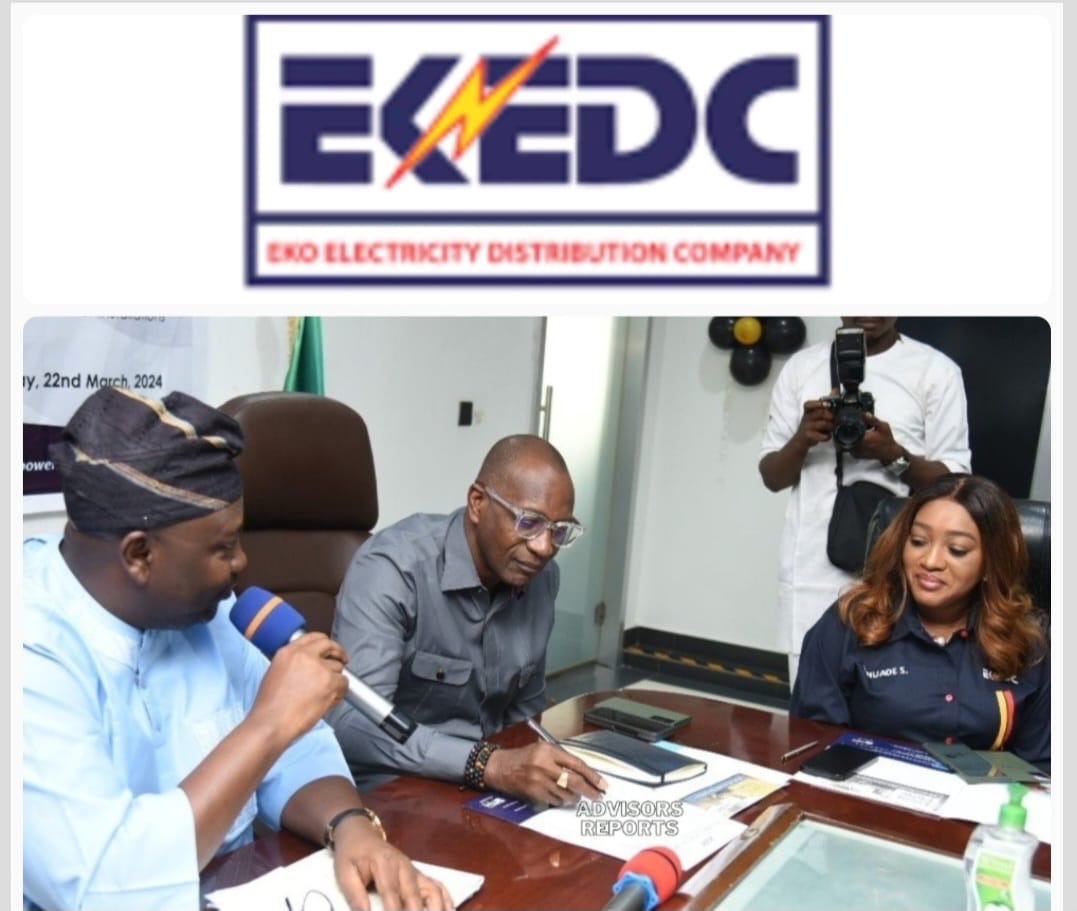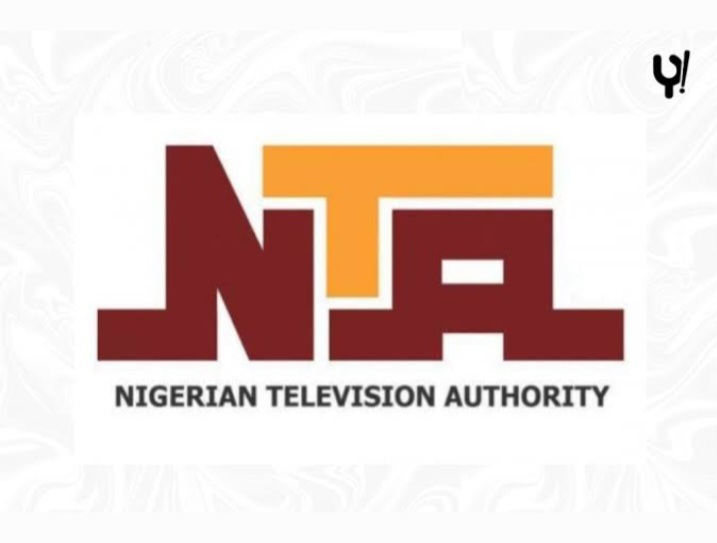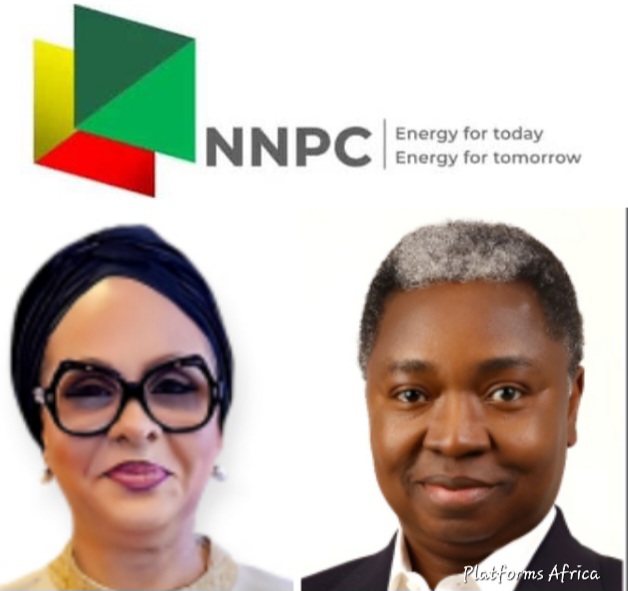. Standard for Others; Adelabu picks EKEDC as a model for other DisCos
Minister of Power, Adebayo Adelabu, has directed electricity distribution companies (DisCos) to prepare for the distribution of 6100MW in the next six months.
This, Adelabu said this when he led a delegation of head of power sector agencies, and Adedayo Olowoniyi, Chief Technical Officer, Chiedu Ugbo, MD, NDPHC, and others, to the Corporate Headquarters of the Eko Electricity Distribution Company in Lagos on Friday, March 22, 2024, becames necessary after the Transmission Company of Nigeria (TCN) successfully conducted system stress tests demonstrating its ability to transmit over 8100 Megawatts, alongside proposed plans for a partial Sovereign Risk Guarantee (SRG) to enhance Generation Companies’ (GenCos) capacity.
The Minister also announced the plan to secure funding ranging from N250 billion to N300 billion to close up the over 7 million prepaid metering gap, on an annual basis over the next four to five years, which he intends to raise through a N75 billion seed capital to be provided by President Bola Tinubu, along with additional debt capital injections from the Nigeria Sovereign Investment Authority (NSIA).
Having exceeded a specified threshold through improved collection efficiency and service quality, Chief Adelabu has also unveiled a strategic plan to utilize EKEDC and Ikeja Electric (IE) as model Distribution Companies (DisCos) to pilot test the anticipated effective supply to be implemented sector-wide in the next few months, which according to him would serve as a standard for emulation by other DisCos.
Earlier, Dr. Tinuade Sanda, CEO of EKEDC, in a statement welcoming the Minister and his entourage to the EKEDC’s Corporate Headquarters, highlighted the company’s remarkable progress since privatization.
She mentioned that EKEDC’s AT&C loss decreased from 45.37% in 2013 to 25.12% by December 2023, surpassing the 2024 target of 11.85% with an achievement of 18.34%. This improvement was attributed to substantial capital investments in infrastructure and expansion initiatives.
Dr. Sanda emphasized that upon acquisition, EKEDC’s monthly billing was below N3 billion, but currently exceeds N21 billion, maintaining the same tariff structure from 2022.
She said, “The company’s revenue has surged from an average of N1.7 billion monthly in 2013 to over N17 billion.
“Our customer base moved from approximately 306,000 customers 10 years ago, to 686,000, after we conducted a comprehensive enumeration process.
Furthermore, Dr Sanda explained that the recorded significant infrastructure growth over the years, with injection substations rising from 47 to 53 and distribution transformers expanding from 8,000 to 12,000+.
READ ALSO:
Wear Skirts, No One Can Stop You, Court Tells Female Corps Members
63% Connected: EKEDC Exerts Leadership In Metering, Targets 100% By 2028
Shell Publishes Reports On Sustainability and Payments To Governments
She noted that the DisCo’s capacity to evacuate power has increased to over 513MW, with plans for further enhancement over the next one year.
“In the past six months, EKEDC invested over four billion Naira in transformers, cables, and rehabilitating 352 feeders.
“We have also invested in network upgrades with modern equipment to ensure reliable power supply, even in adverse weather conditions.
“Despite a debt profile exceeding N131 billion in the last decade, including N36 billion owed by MDAs, EKEDC is committed to addressing liquidity challenges through targeted disconnections, including government entities.
MD has therefore urged customers including heads of MDAs to settle their bills promptly for continued quality service, warning of potential mass disconnections for defaulters.
Responding to the remarks by the MD of EKEDC, Chief Adelabu commended the management of the DisCo for sustaining a good record and statistics achieved in the last ten years since the company took over the operations of the utility firm.
Highlighting the pivotal role of Distribution Companies (DisCos) in customer service, Chief Adelabu emphasized the need for proactive engagement and efficient operations at this frontline level to address consumer needs effectively.
According to him, there are five major segments of the entire power value chain including the gas supply, generation, transmission, distribution, and consumer engagement.
Highlighting the critical role of electricity customers in the final stages of power sector value chain, in relation to the issues like metering, vandalism and debt collection, the Minister called upon Distribution Companies (DisCos) to elevate their customer engagement strategies.
He stressed the need to cultivate effective demand for power, adding that power generation efforts would be rendered ineffective without a supportive base of willing and paying customers.
Chief Adelabu pointed out that customers complaints about the country’s power situation are legitimate and widespread, affecting every individual.
He acknowledged the thankless nature of working in the power sector, noting that despite optimization efforts, complaints about power deficits will always persist.
He therefore encouraged the players in the sector including the DisCos to be committed to persevering more in the face of criticism, viewing it as a motivation to drive further progress and meet the nation’s energy needs effectively.
The Minister of Power reflected on the multitude of complaints received in the past four to six weeks over the state of power in the country, and its difficulties, emphasized that his Ministry has maintained focus and determination in addressing all the critical issues such as liquidity challenges, lack of investment, infrastructural deficiencies, decay, human capacity limitations, and operational hurdles within the power sector.
READ ALSO:
Something Cooking? Shell Nigeria Country Chair Meets Ghana’s Energy Minister
Delta Community Razed After Killing Of Soldiers In Communal Clash
Terrorists Kidnap 87 In Fresh Kaduna Attack
The Minister, while revealing President Tinubu’s prioritization of the power sector to drive overall economic development, stated that a significant portion of the President’s Renewed Hope agenda focused on electricity, calling for collective efforts by all the players to fulfill promises made to Nigerians.
Recognizing the long-standing energy poverty endured by Nigerians, the Minister therefore unveiled the urgency to alleviate that burden and improve power delivery across the country within the next six months.
The Minister outlined a strategy to prioritize service provision to customers in higher billing bands (Band A and B) while gradually extending improved services to all segments (Band C and others) through strategic infrastructure investments.
Chief Adelabu also contrasted the current approach with strategies adopted by his predecessors under previous administration, emphasising that the Ministry of Power under him is committed to a shift towards a bottom-up methodology that prioritizes establishing a robust market at the last-mile, fostering effective demand, and enhancing grid capacity and generation capabilities.
This approach, according to Adelabu, aims to incentivize investors by ensuring a conducive environment for returns on investment, signaling a shift towards a more sustainable and customer-centric power sector strategy.
He said, “This is the fundamental principle of investment and return, akin to a bank. It is impractical to solely rely on equity for funding all aspects of the power sector, a practice not adopted by any nation.
“To attract lenders, we must present an appealing investment landscape to facilitate the inflow of substantial debt capital, both domestically and internationally.
“The power sector faces significant infrastructure challenges, evident in the widespread deficit. Generation Companies (GenCos) often operate below their installed capacity, with operational efficiency hovering around 60-70% and available capacity frequently below 20%.
“Many turbines remain underutilized due to inadequate maintenance, operational issues stemming from foreign exchange constraints, and parts unavailability.
“Operational GenCos encounter hurdles in securing sufficient gas feedstock, leading to diminished available capacity. Presently, generation capacity is not a primary concern, as we can swiftly escalate it from 6000MW to 8000MW.
“Notably, transmission capacity has seen enhancements, with the Transmission Company of Nigeria (TCN) successfully wheeling 5800MW in March 2021, showcasing significant infrastructural improvements over the past three years,” Adelabu stated.
Going by the massive investment by the TCN since 2021, the Power Minister has therefore expressed confidence in the TCN ability to wheel over 8100MW, affirming that the system has been stress-tested to confirm that capability.
The focus, according to him, now shifts to testing this capacity with a minimum generation target of 6100MW in the next six months.
He therefore noted that the challenge lies in ensuring that the DisCos are prepared to receive this power.
The Minister therefore urged the DisCos to commence preparation in alignment with the plan to demonstrate consistent electricity supply for Band A and B customers for 20-24 hours daily, with others enjoying 14-16 hours.
He revealed the plan by the Government to sustain that feat for a month to showcase the benefits of stable power supply to customers and justify reasons why they must be willing to service their consumption.
Adelabu stated that the stability in power supply will pave the way for tariff reviews and potential price adjustments, emphasizing that those who can afford to pay should do so.
Addressing the issue of Prepaid Metering, Adelabu emphasized the need for Nigeria’s power stakeholders to elevate their efforts in metering, assuring the commitment of the Presidential Metering Initiative to provide support in that critical area.
He highlighted the importance of focusing on effective prepaid metering initiatives, acknowledging that Credited Advance Payment for Metering Implementation’ (CAPMI), National Mass Metering Programme (NMMP) and other past metering initiatives were not as successful.
Adelabu said that the PMI, is presently reviewing all the metering programs to identify and implement the most efficient strategies.
Notably, he referenced the recovery of N32 billion (equivalent to $200 million at an exchange rate of 160/$) from Messrs Ziklagsis, earmarked for meter acquisition since 2003, targeting 3 million meters due.
According to him, the agreement was not implemented by the contractor while the fund remained in the bank account of Ziklagsis at the then Prudent Bank from where it moved to Skye Bank, Polaris and lately, Providus Bank, before we intervened and recovered it under this administration.
Adelabu noted that had the planned meters been installed since 2003, the current 8 million metering gap would not exist.
The Power Minister has therefore outlined plans for metering initiatives, aiming to install a significant number of meters annually over the next four to five years to either eliminate or substantially reduce the metering gap.
He said, “With a N75 billion seed capital from President Tinubu and additional debt capital injections from the Nigeria Sovereign Investment Authority (NSIA), an annual funding of N250 billion to N300 billion is projected for the next few years to address the metering shortfall comprehensively.
The Minister, while calling for patience from all, hinted that the effort to address the longstanding issues in the power sector requires time due to their historical origins.
He therefore attributed the sector’s challenges to a collective failure involving all stakeholders, including customers and the government.
Adelabu said, “But Nigerian needs to be patient, the problems cannot be fixed overnight because it does not emanate overnight. It is a consequence of past actions and inactions of everyone.
“So, we need time to resolve it. Gone are the days where we solve problems on the surface, and it will bounce back. We are addressing the fundamental issues that must be fully addressed, which takes time to be solved. Without pain, there cannot be gains.
“The approach now by all players should be how we can effectively address fundamental issues thoroughly to prevent recurring challenges, emphasizing that enduring solutions may entail initial challenges before yielding positive outcomes,” he said.
Speaking concerning proposed electricity tariff review, Adelabu clarified that he has not advocated for an immediate removal of electricity subsidy, deeming it insensitive given the current economic challenges faced by Nigerians.
Acknowledging the global presence of subsidies, the Power Minister emphasized the need for a phased approach towards subsidy removal in the electricity sector.
Adelabu hinted that the current tariff levels are unsustainable and could lead to financial struggles for Distribution Companies (DisCos), potentially resulting in significant government subsidies.
Adelabu said, “I have been misquoted over this matter. I never advocated for a one-time removal of electricity subsidy because it would be insensitive at a time when Nigerians are facing significant hardships.
“There is subsidy all over the world, but the government cannot continuously offset the existing subsidy on electricity. We must have a plan for a phased removal of subsidy.
“However, electricity tariffs cannot remain at the current level as it is unsustainable for the industry in the long term.
“DisCos are struggling to pay 10 percent of the GenCos invoices at the current tariff, and if this continues, the President Tinubu will have to pay close to N3 trillion in a year on electricity subsidy, which is over 10 percent of the Government’s 2024 budget.”
Adelabu has therefore recommended the need for a strategic approach to gradually phase out the subsidy to ensure the sustainability of the power sector amidst financial constraints and industry viability concerns.
He pointed out that the power sector is not the sole recipient of government funding, with various sectors like work, housing, and defense also requiring financial support.
The Power Minister further called on the DisCos to demonstrate tangible improvements in electricity supply before considering tariff adjustments to avoid further burdening Nigerian citizens.
According to him, Nigerians have great expectations; they have suffered too long under energy poverty. He added that at the slightest service disruption, the masses will always be aggressive and touchy.
He therefore added that over the six months, all the players should be able to make a noticeable difference, adding that his goal is to significantly reduce energy poverty and enhance the reliability of energy services for the populace.
Adelabu said, “Power is everybody’s business. When you see complaints about outages and blackouts, it is normal. The epileptic power situation in the country affects everyone, unlike the Foreign Exchange crisis that impacts only a portion of individuals dealing in foreign exchange.
“When it comes to power, it is always 100 percent; even if we are achieving 60 percent optimization, people will still complain about the 40 percent power deficit.”
Adelabu while calling for accountability and transparency in the power sector, said, “We should not cover ourselves up; we need to hold each other accountable by ensuring that all stakeholders are vigilant.
“Let the Chairman of TCN be reported if there are shortcomings in improving the system. Reporting ineffective players is not detrimental; it signifies safeguarding national interests.
“Reporting any ineffective public official is not personal but institutional. The strength of the chain is as robust as its weakest link; we must not allow one individual’s shortcomings to jeopardize the collective effort.
“Moving forward, I will not accept excuses, as results matter more than explanations. Every player operating within the value-chain should be ready to escalate issues affecting overall personal and over performances, by maintaining regular meetings with all critical players to monitor progress and address any challenges affecting the sector,” Adelabu said.
Adelabu hinted on the plan to implement a partial guarantee facility to generating companies across Nigeria, to ensure that payments are secured for gas supplier.
He said, “We are working on an arrangement where there will be some partial guarantee, so there will be assurance that gas suppliers and other will get their money from the GenCos.
“That is one of the conditions that will compel GenCos to perform optimally and more efficiently. There is no other reason for that apart from the fact the need to sign an offtake contract with the Gas Companies in the form of assurance for payment on every scf of gas supplied to the power plants.
“So, if we are serious as a government, this is not too much. We are not soliciting a guarantee for the entire power plant; we are only suggesting a guarantee for their minimal capacity.
“When a company is signing a gas supply contract, it will be based on the volume of scf required to produce 200MW. Every other GenCos will be offered this partial guarantee to ensure that they will get their money back in the next three months. We will discount this cost with the commercial banks,” Adebayo hinted.
Adelabu further emphasized the need to stabilize the power sector market with the introduction of creative and sustainable financial instruments.
He said, “We also need to stabilize the market by bringing in debt factoring which should be active in within the power sector due to the illiquidity that exists.
“There must be debt factoring agents willing to purchase debts at a price to provide liquidity.
“This is crucial for achieving the continuity and sustainability of the power sector,” Adelabu said.
He said adopting debt factoring as a mean of addressing liquidity challenges in the power sector will ensure long-term viability.
“The problem in the Nigerian power sector is not engineering or technical; over the years, successive administrations have implemented tested technology, but the lack of significant progress is attributed to liquidity, funding, structural issues, strategy, and financing, areas where accountants excel.
He said, “It is no accident or coincidence that the Minister and some key players in the sector are Accountants as career professionals.
The Power Minister has therefore proposed a structured approach where enhanced service delivery precedes any tariff revisions to justify such changes effectively.
He called for a national discourse on restructuring the industry, suggesting that DisCos be reorganized along state lines to enhance operational efficiency.
Adelabu mentioned the challenges faced by IBEDC, which covers seven states from Ogun to Niger, Kogi, Niger, Ekiti, and Ondo, in delivering effective services.
He said, “In contrast, EKEDC and IKEDC have shown more focused service delivery by concentrating on Lagos state and select areas in Ogun state.”
The Power Minister therefore emphasised on the importance of having identifiable DisCo in each state and has therefore encouraged the state governments and State Assemblies to speed up legislations to engage with power provision for sustainable development.





